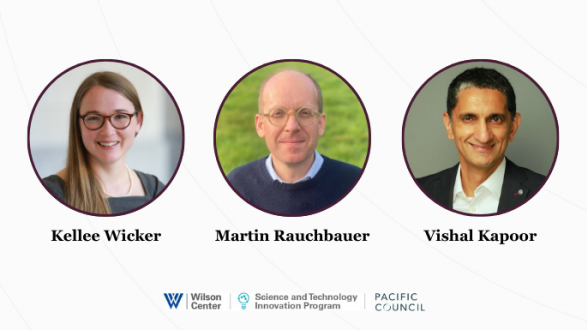Zoom Webinar
As artificial intelligence continues to drive global innovation and power, nations are increasingly considering and adopting AI policies based on AI nationalism or foreign and domestic policies aimed at securing their own AI technologies. These policies have significant implications for international relations, economic security, and geopolitical stability.
In collaboration with the Wilson Center, the Pacific Council is hosting a webinar where our panel of experts will explore how AI nationalism shapes global power dynamics and what it means for the future of American foreign policy. This event will delve into the rise of AI protectionism, tech sovereignty, the weaponization of AI, and how the U.S. can navigate these challenges to maintain leadership in global AI development. Guests will gain insights into the strategies the U.S. may need to adopt in an AI-driven world order and how cooperation and competition in AI will redefine global relationships. There will be time for Q&A with speakers.
To register for this webinar, visit Zoom Registration Page.
Guest Speaker
Kellee Wicker is the Director of the Science and Technology Innovation Program at the Wilson Center. She brings over a decade of policy and international affairs expertise to the role, as well as a lifelong passion for technology. In her role at the Wilson Center, Kellee aims to illuminate emerging technologies and scientific advances that will impact numerous parts of life worldwide while helping to shape the policies designed to bolster and manage the innovation cycle.From a young age, Kellee's deep love of engineering and technology led her to work in everything from behavior-based robotics to data analysis and infographic design in R, to HTML5 and CSS coding for web design. She brought that interest into both how she executed her research work, always pursuing cutting-edge tools and analysis, as well as what she researched, from the role of technology in educational systems to nascent green technology to address the international impacts of climate change. Immediately before joining the Wilson Center, Kellee served as the Chief Operating Officer for the NewDEAL, a nonprofit organization dedicated to supporting moderate elected officials across the United States at the state and local levels. Through her leadership, over 200 leaders were equipped with novel policy solutions, frequently providing insights at the crossroads of technology and government. Furthermore, Kellee's leadership and communication skills were essential in the organization's growth, increased fundraising, widespread press coverage, and the successful execution of semiannual national conferences that engaged U.S. leadership at the highest levels.
Kellee received a Master's in Global Public Policy from the Lyndon B. Johnson School and a Master’s of Arts in Latin American Studies from the University of Texas. She earned her bachelor's degree in international studies and Spanish from the University of Mississippi. She has written on education reforms in Brazil, Uruguay's political system, technology's ability to mitigate climate-related disasters, entrepreneurial ecosystems and targeted development in America's less-advantaged communities, and the growth of international trilateral aid in foreign development. Her research has supported the U.S. Department of Defense, the World Bank, the Millennium Challenge Corporation, and other partners.
Guest Speaker
Martin Rauchbauer is the Co-Founder of the Tech Diplomacy Network, a platform for practitioners representing governments, civil society, and global tech companies to tackle planetary challenges with frontier technologies. Previously, he served as Austria's first Tech Ambassador in Silicon Valley, where he shaped the emerging field of tech diplomacy, engaged in transatlantic digital diplomacy and digital human rights, and developed digital humanism as a strategic focus of Austrian foreign policy. He is passionate about bridging the gap between diplomacy, arts, technology, and the environment and has published and lectured on these topics. Currently, he also serves as the Executive Director of the Djerassi Resident Artists Program, one of the world's leading artist residencies.
Moderator
Vishal Kapoor is the Chief Operating Officer of Chia Network. He also serves as a member of the Global Advisory Council at The Wilson Center, a leading non-partisan think tank in Washington, DC. He is a seasoned technology executive, having served as CEO of Paradata, a machine learning-based RPA platform for supply chain data analysis. Vishal is also a partner at Three Legged Stool, a company focused on developing software solutions for the COVID-19 crisis and beyond. Earlier in his career, he held leadership roles in engineering, sales, and product management at Alcatel, Silicon Access Networks, Verisity, and Cadence. He began his career contributing to the discovery of the Higgs Boson by building big data and tiered data acquisition systems at the Superconducting Super Collider for the U.S. Department of Energy.







